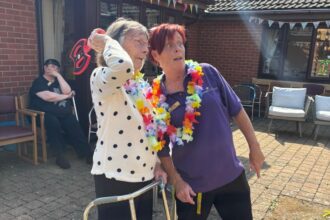Anxiety can be a constant burden, causing stress and strain on daily life. While medication can be helpful for some, others prefer gentle approaches or feel more in control of their healing process. Natural and effective strategies can provide relief, helping the mind and body find balance over time. Many people worldwide seek ways to feel calmer and more present without relying on medication while seeking help for anxiety. While no single solution works for everyone, there are several science-backed methods that can make a real difference. Engaging in open conversations with a caring friend can help explore calming techniques, lifestyle changes, and mindset shifts to help feel more at peace. While not completely silencing anxiety, learning to quiet its voice can help reclaim more of your everyday joy.
Help for anxiety: deep breathing and grounding exercises
When anxiety strikes, your body often goes into high alert. Your breathing becomes shallow, your heart races, and your muscles tense. One of the simplest yet most powerful ways to interrupt this cycle is deep, intentional breathing. Try the 4-7-8 method. This lets your nervous system know it’s okay to unwind. Additionally, grounding activities assist you in focusing your attention on the here and now rather than worrying thoughts. The 5-4-3-2-1 strategy is a well-liked approach. List five things you can see, four that you can feel, three that you can hear, two that you can smell, and one that you can taste.
Movement that feels good
Exercise is not just for fitness. Movement releases endorphins, your body’s natural mood boosters. You do not have to commit to intense workouts to get results. Gentle activities like walking, stretching, yoga, or dancing in your living room can all help reduce anxiety levels. Choose a movement that you enjoy. If it feels like a punishment, it will only add more stress.
Mindful practices
Simple ways to practice mindfulness include focusing on your breath, paying attention to the taste and texture of your food, or noticing the sensation of your feet on the ground as you walk. You can also try guided meditations that lead you through visualizations designed to calm your mind.
A calming sleep routine
Building a calming bedtime routine can help break this cycle. Try dimming the lights an hour before bed, avoiding screens, and listening to soothing sounds or gentle music. Reading a light-hearted book or journaling your thoughts before sleep can also clear your mind.
Nourishment for the mind and body
What you eat affects how you feel. A diet rich in whole foods, lean proteins, fresh fruits, and vegetables supports brain health and emotional balance. Omega-3 fatty acids, found in foods like walnuts and chia seeds, can help reduce inflammation that may contribute to mood disorders. Avoid excessive caffeine and sugar, as both can cause energy spikes and crashes that worsen anxiety symptoms. Staying hydrated also supports clear thinking and emotional stability.
Journaling as a release
Writing down your thoughts can be incredibly freeing. You may even notice patterns or triggers that you can address. You do not need to write formally. Start with a simple question like “What am I feeling right now?” and let the words flow. Some people find it helpful to end their journaling sessions by listing three things they are grateful for, which shifts focus toward positive aspects of life.
Building a support network
Trusted friends, family members, or support groups can provide encouragement, perspective, and understanding. Talking about your feelings can lighten the emotional load and help you see solutions you might have missed. Connection is a basic human need, and isolation can make anxiety worse. Even short conversations or shared activities can lift your mood and remind you that you are not facing this challenge by yourself.
Practising self-compassion
One of the most overlooked forms of help for anxiety is learning to treat yourself with kindness. Many people speak to themselves in ways they would never speak to a friend. The next time you notice critical thoughts, pause and reframe them. Instead of “I should not feel this way,” try “It is okay to feel this, and I am doing my best.” Self-compassion softens the edges of anxiety and makes it easier to keep moving forward.
Finding help for anxiety without medication is possible and can be deeply rewarding. While there is no single cure, small, consistent changes can build a foundation of calm and resilience. Think of these strategies as tools in your personal care kit, ready to use when life feels overwhelming. You deserve to feel lighter, more present, and more in control of your thoughts. Be patient with yourself, celebrate small victories, and remember that progress is still progress, no matter how slow it feels. Over time, these natural approaches can help you not just manage anxiety but create a life that feels steadier and more joyful.
Tim Williamson, a psychology graduate from the University of Hertfordshire, has a keen interest in the fields of mental health, wellness, and lifestyle.








